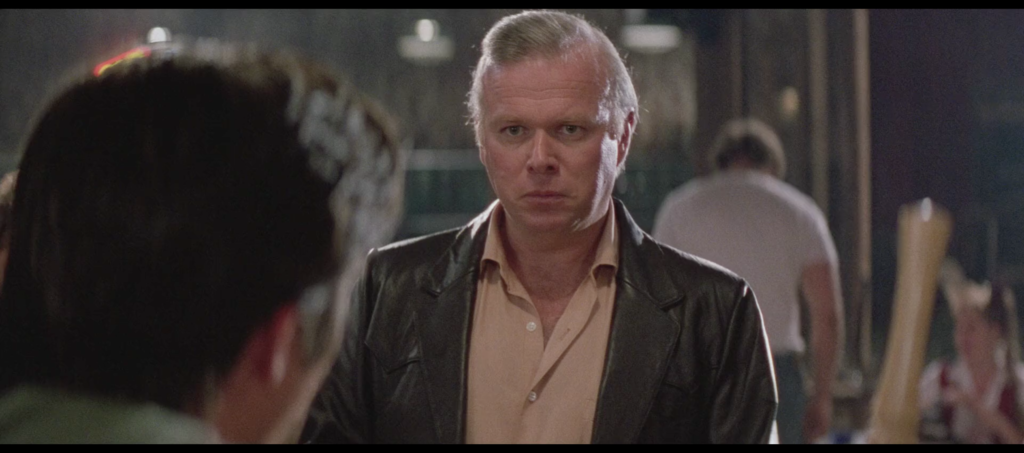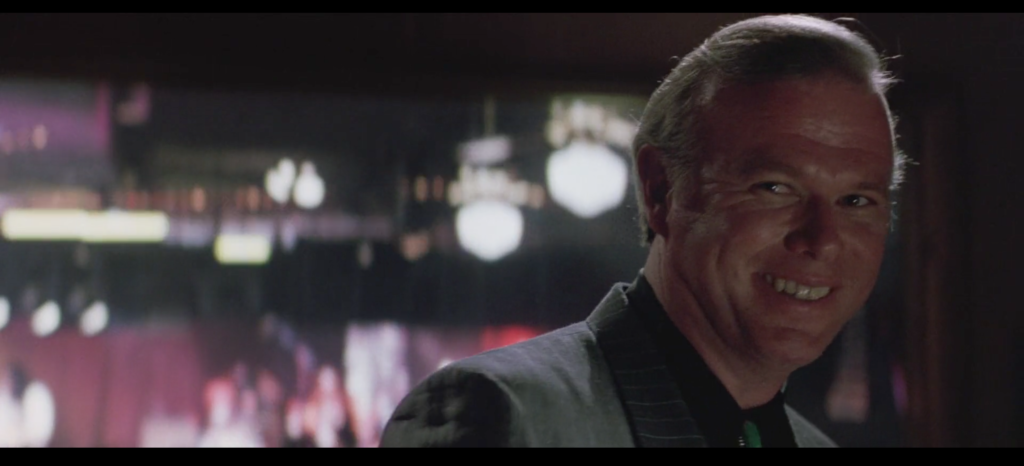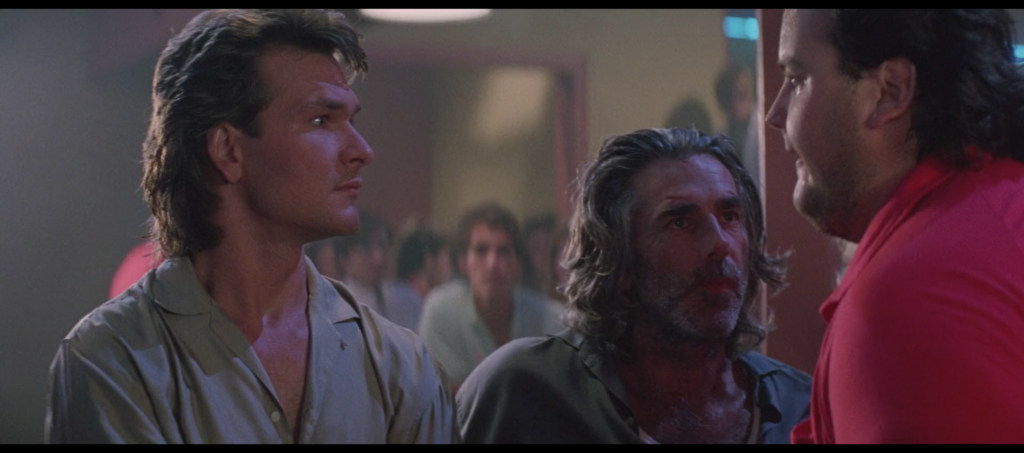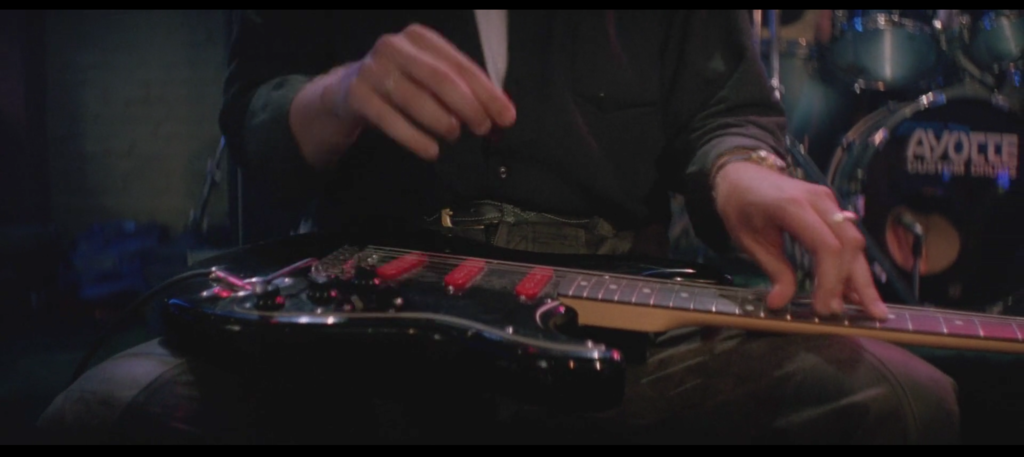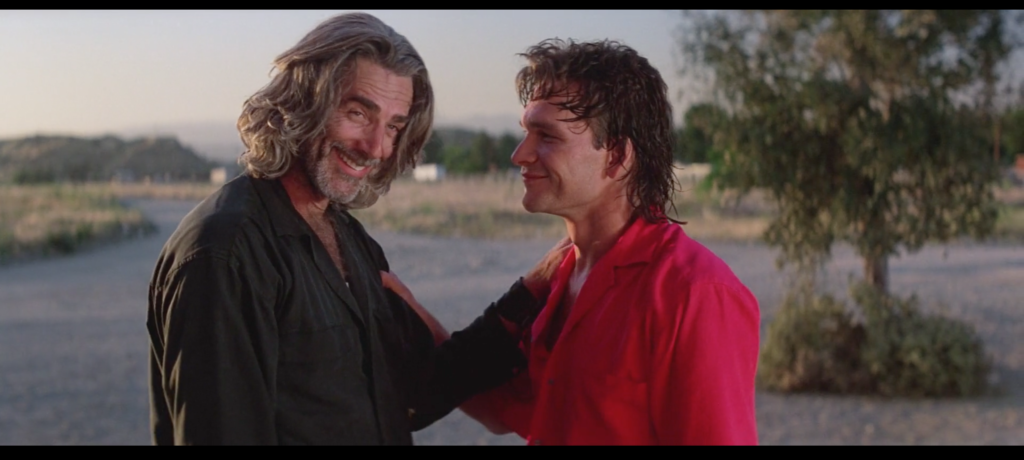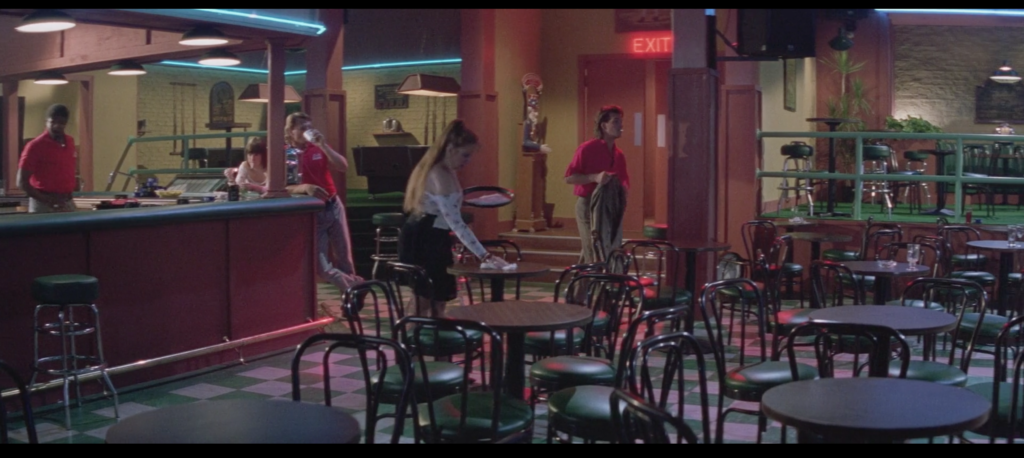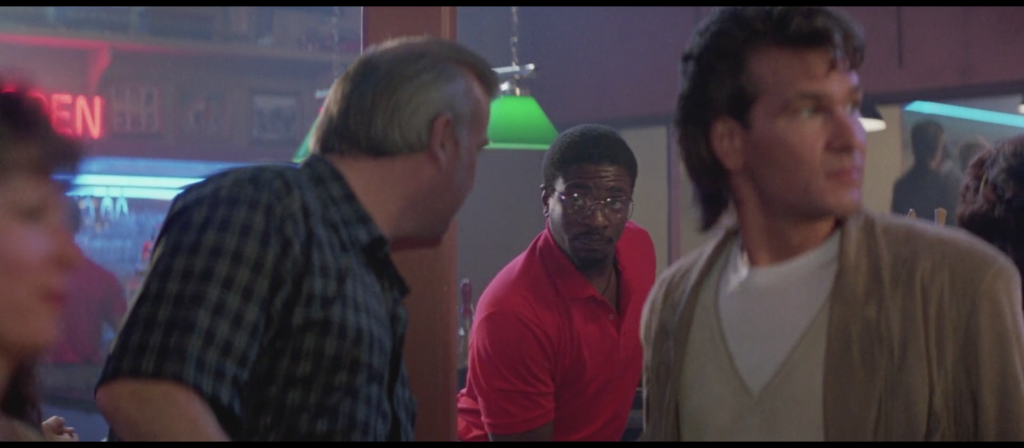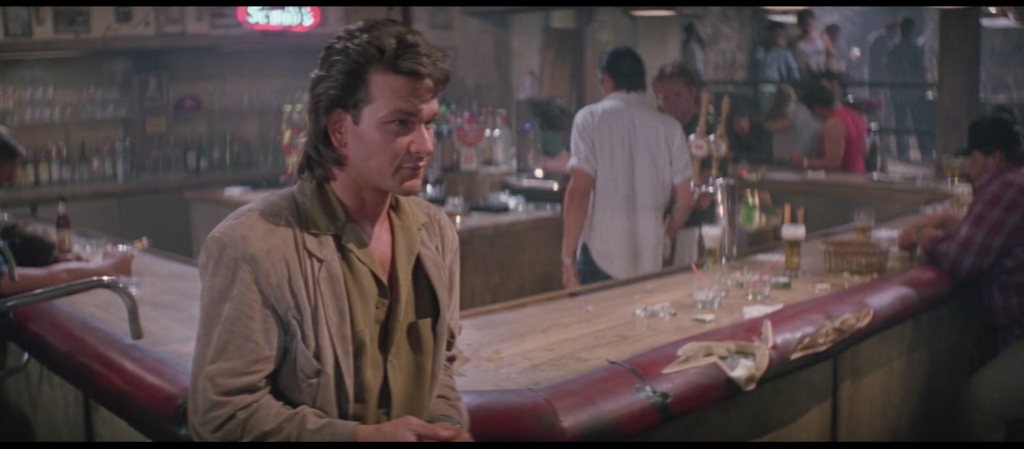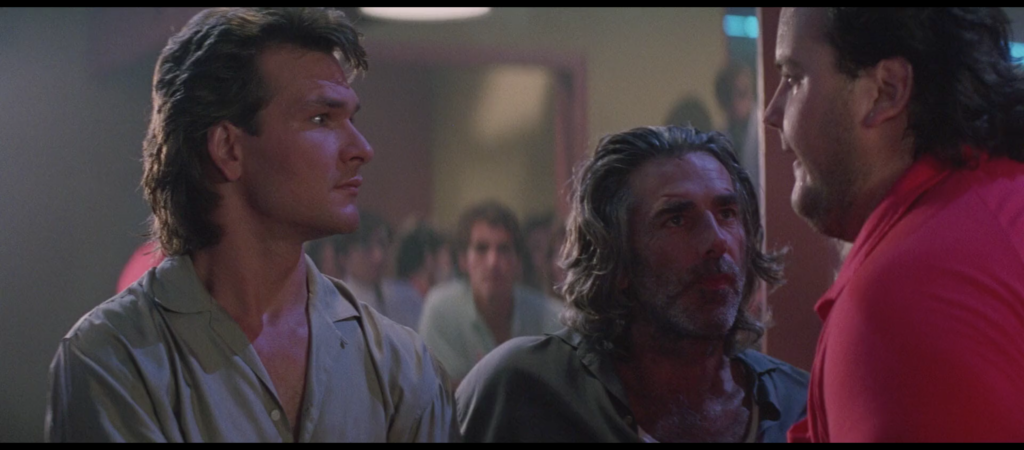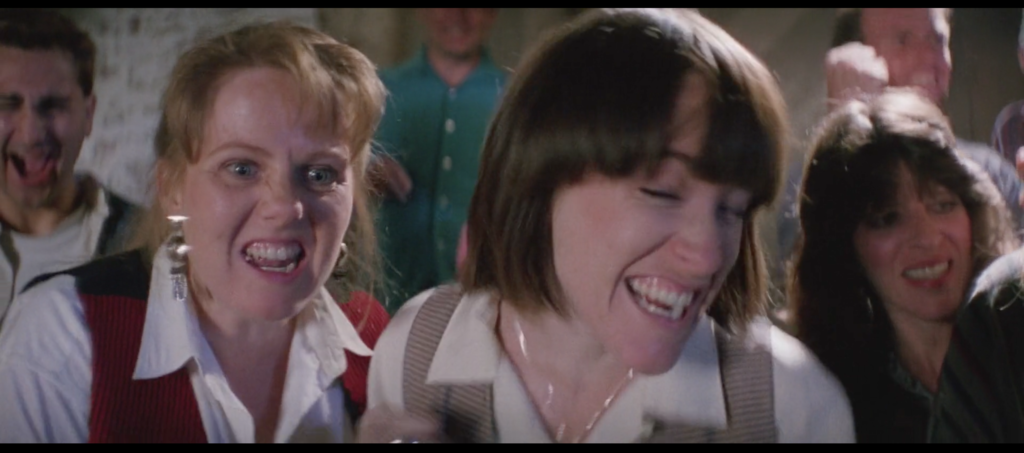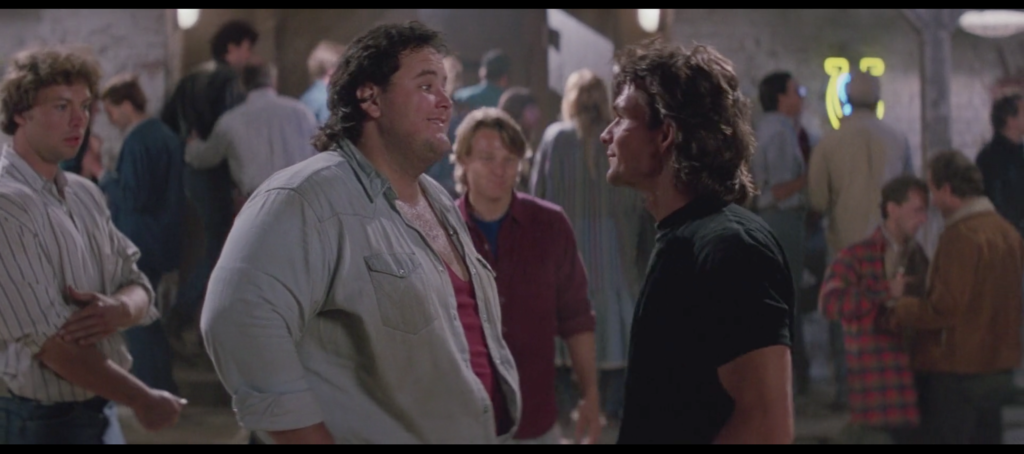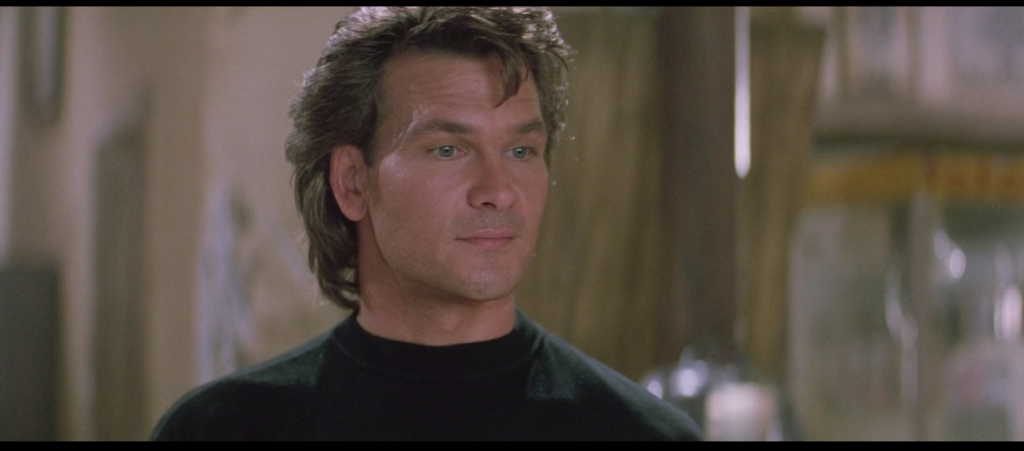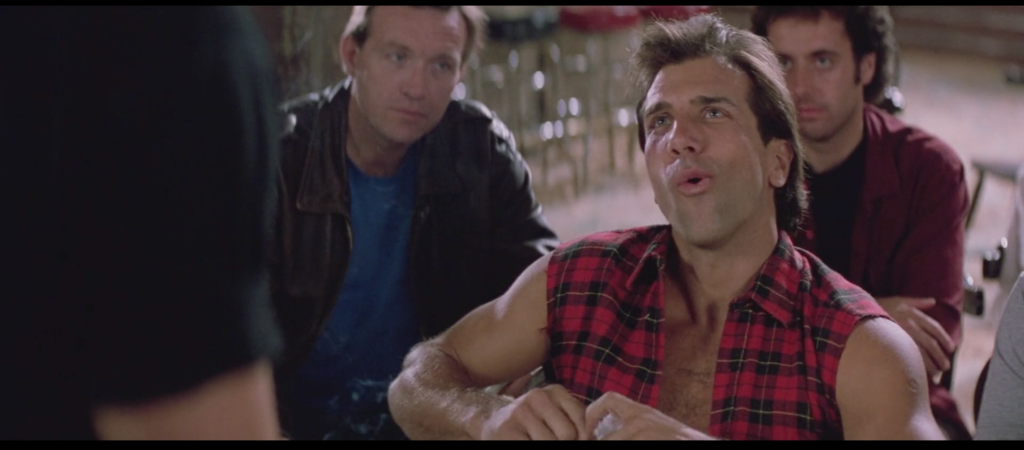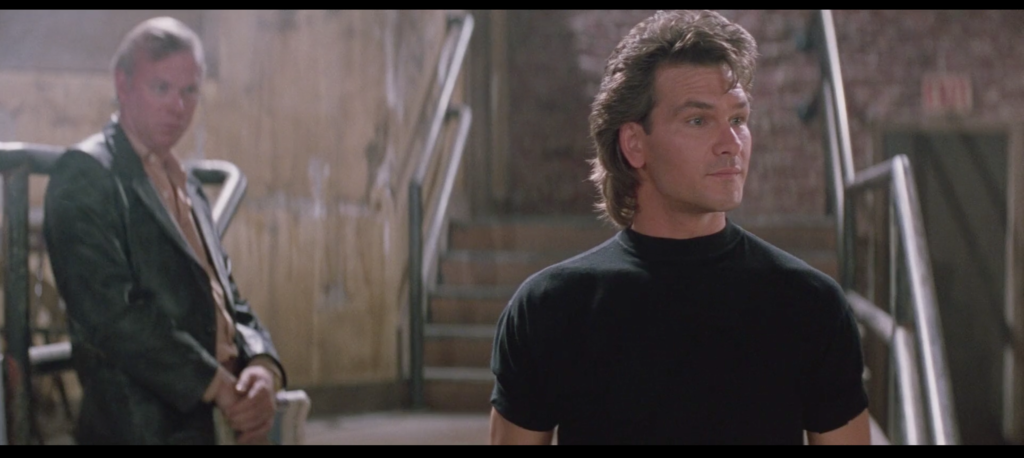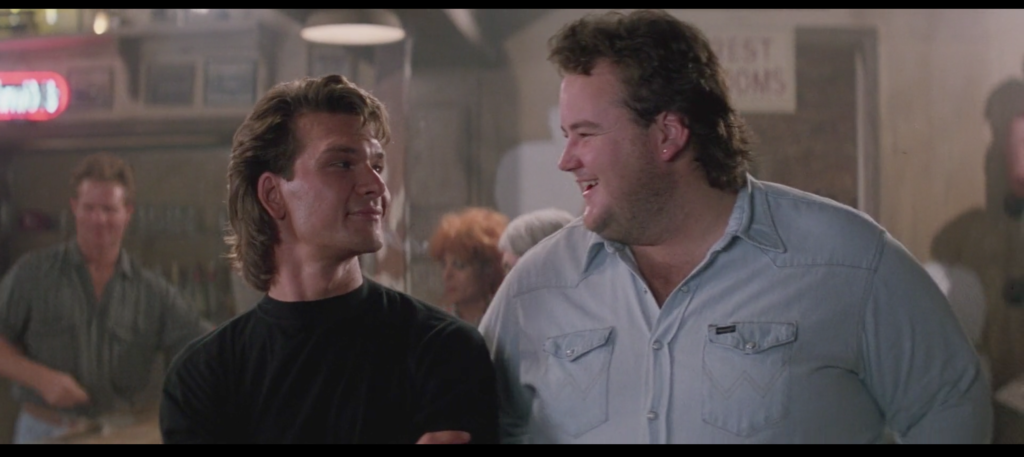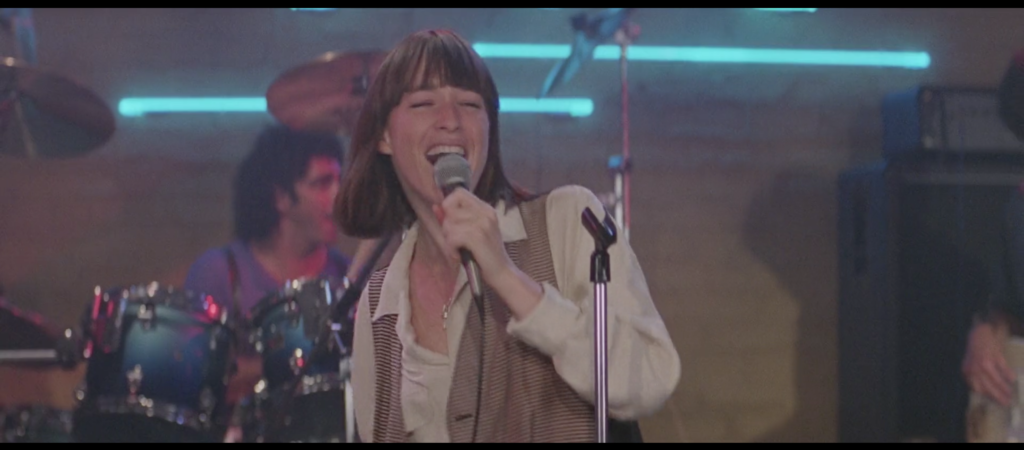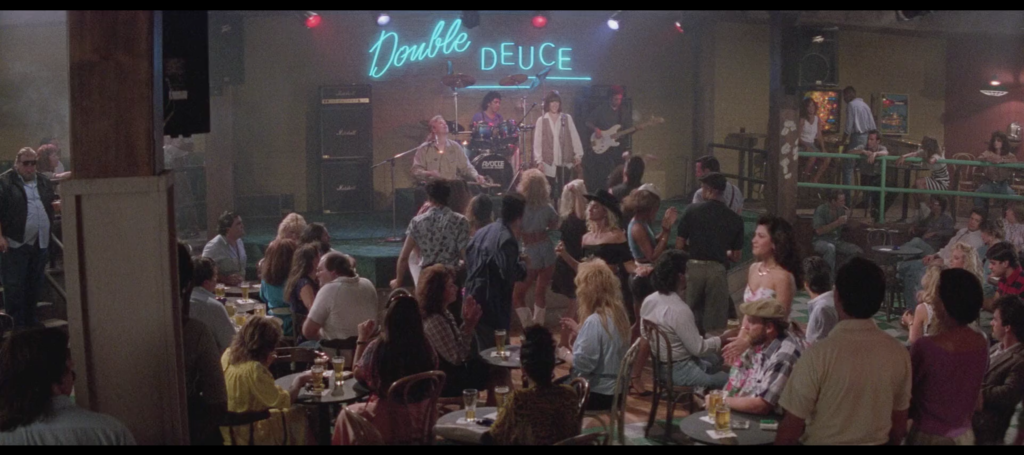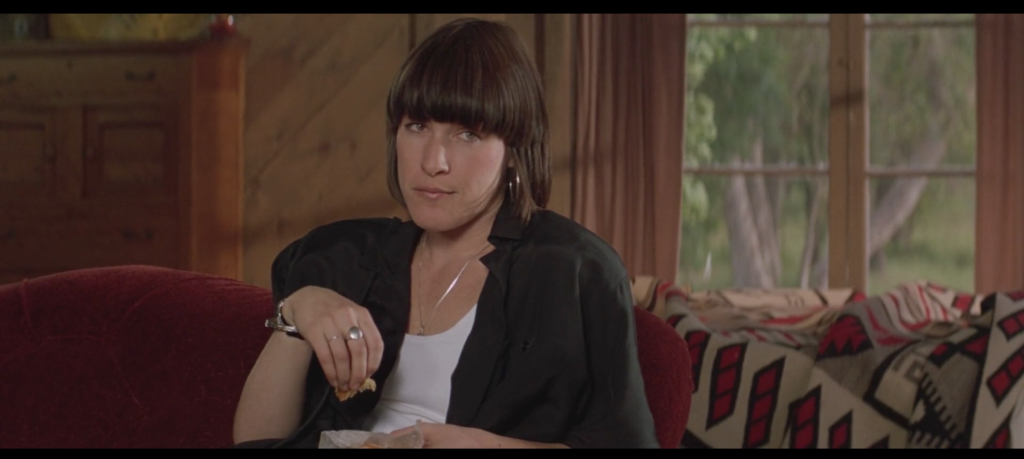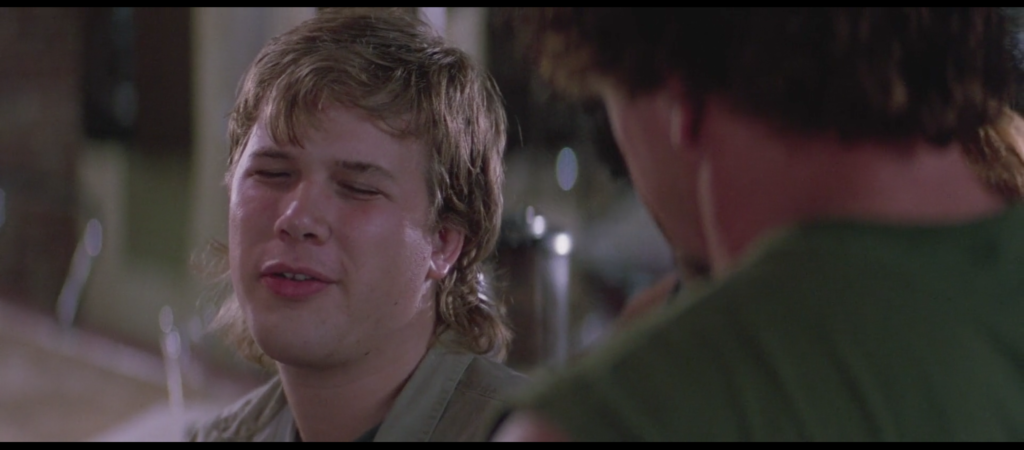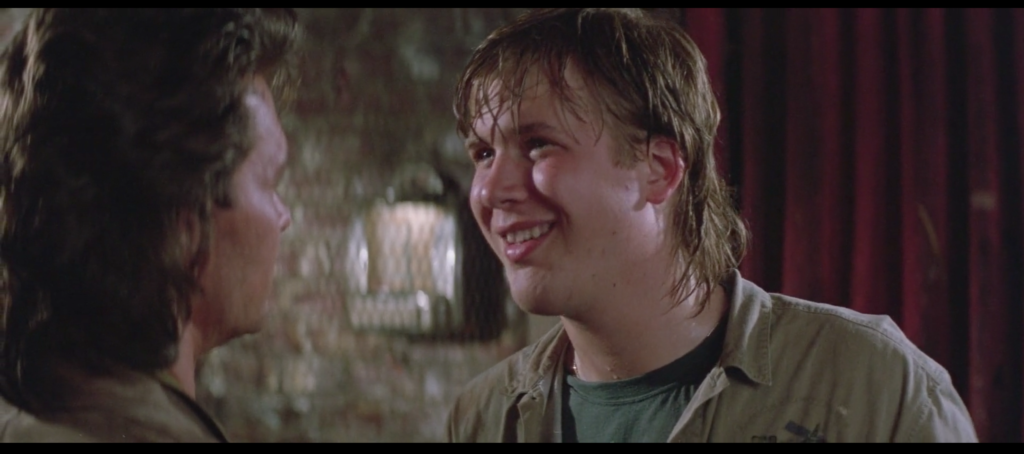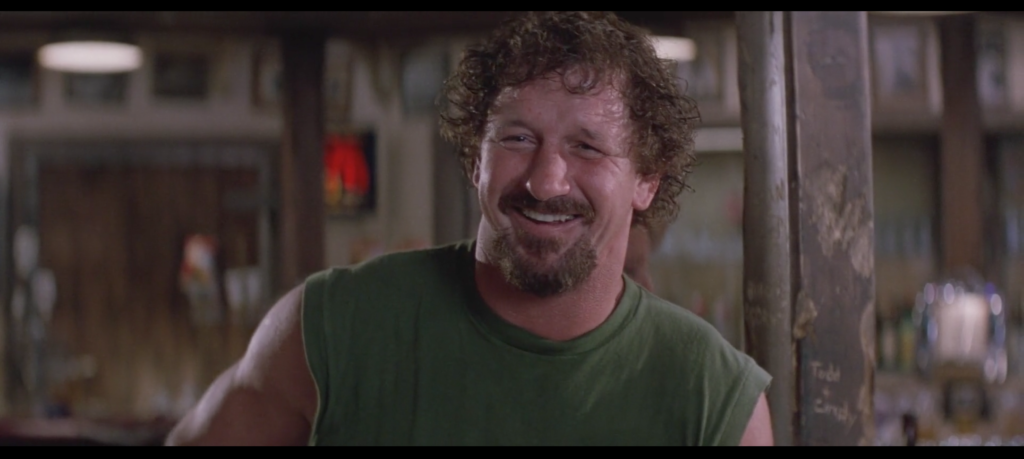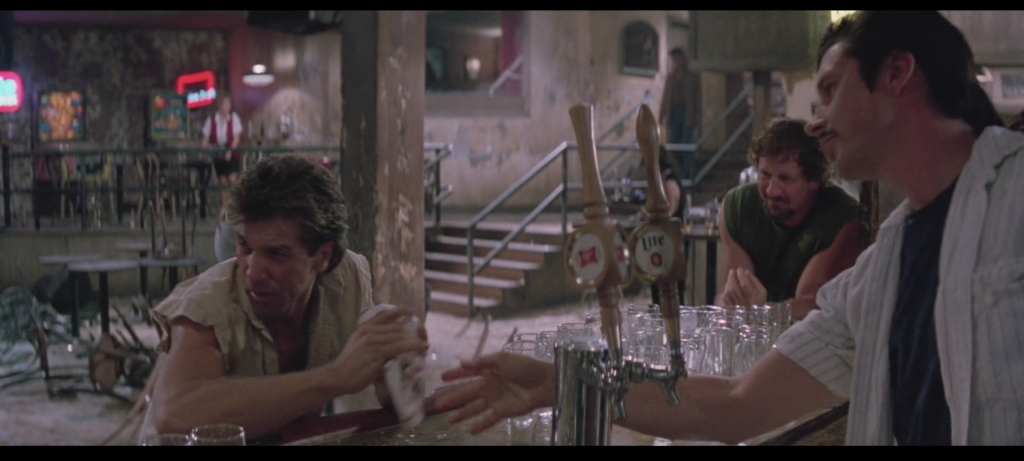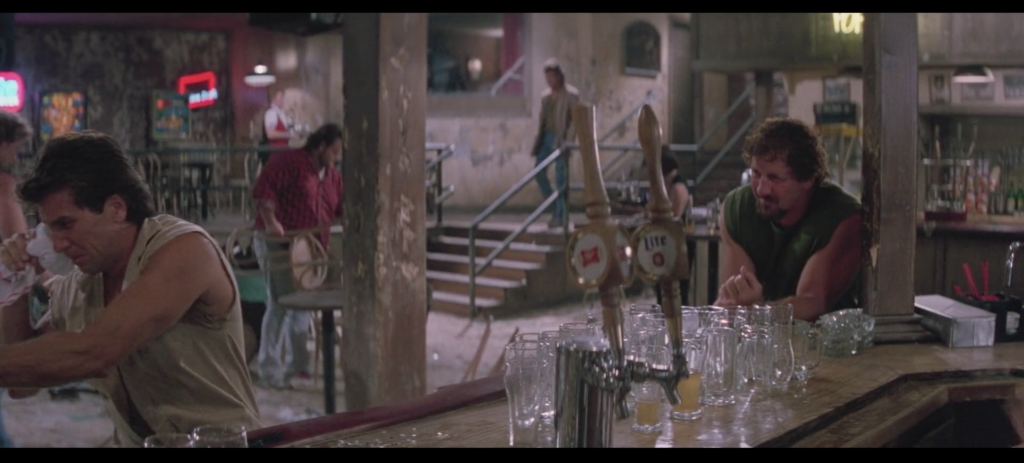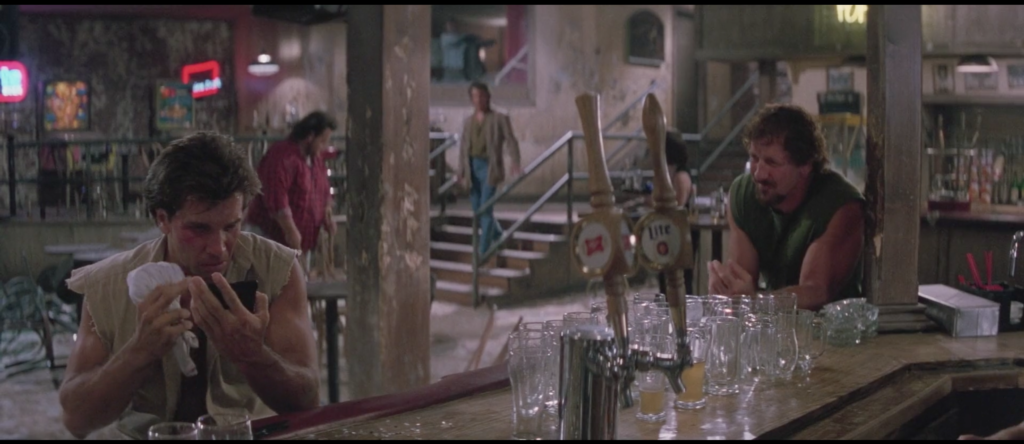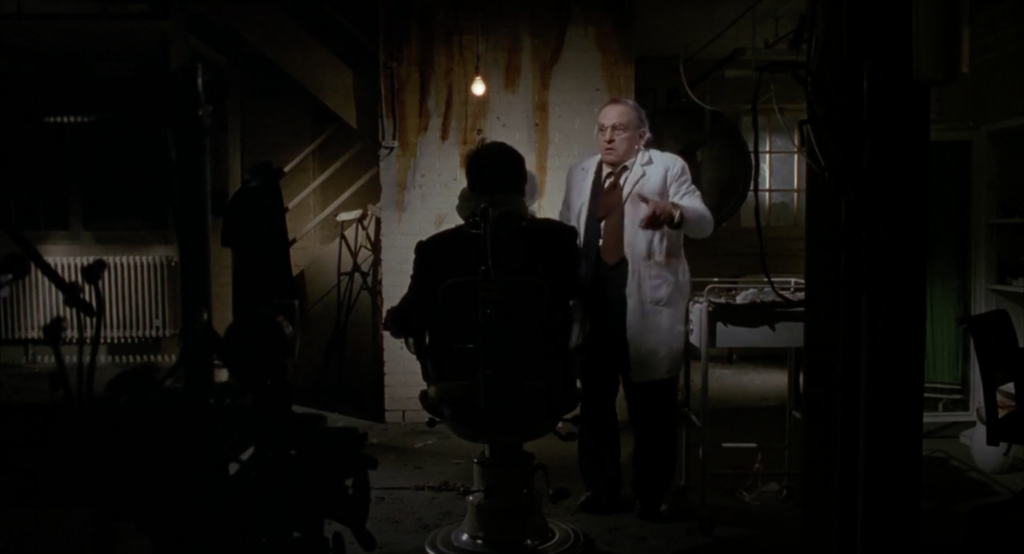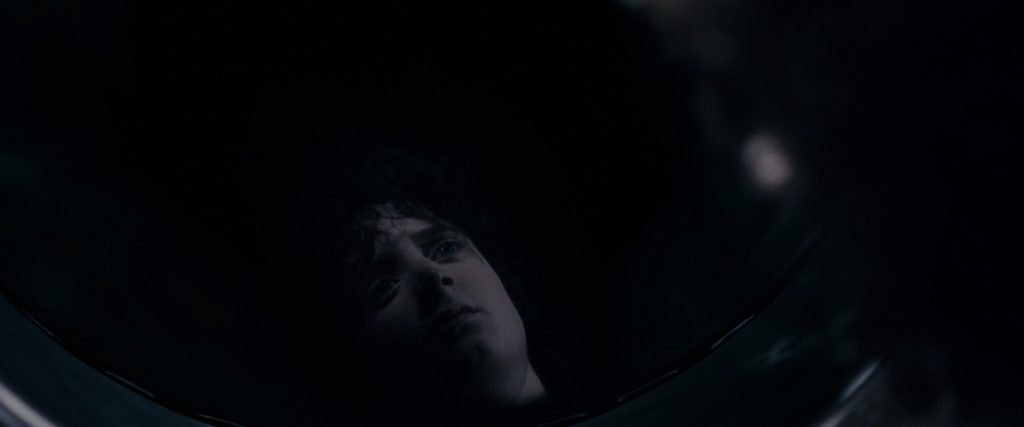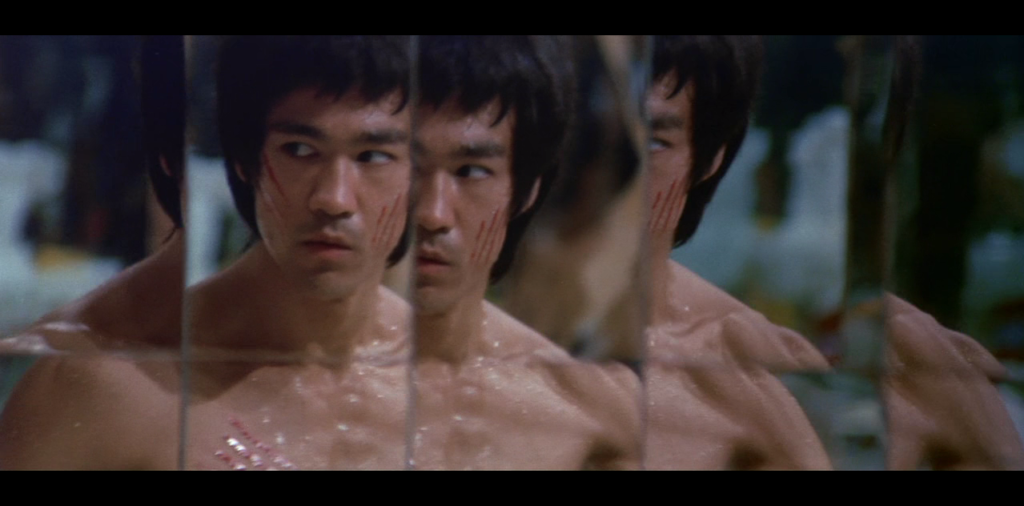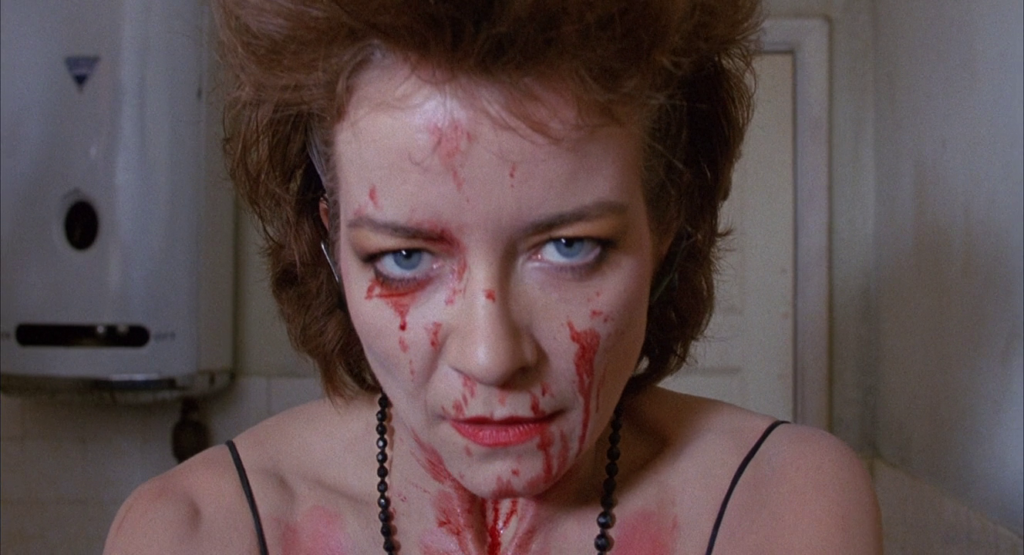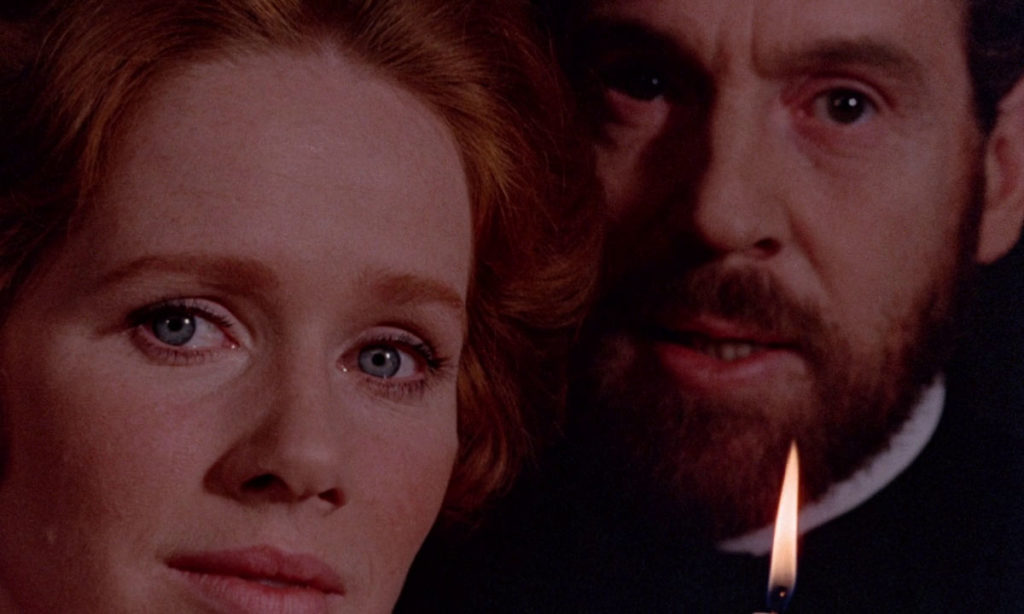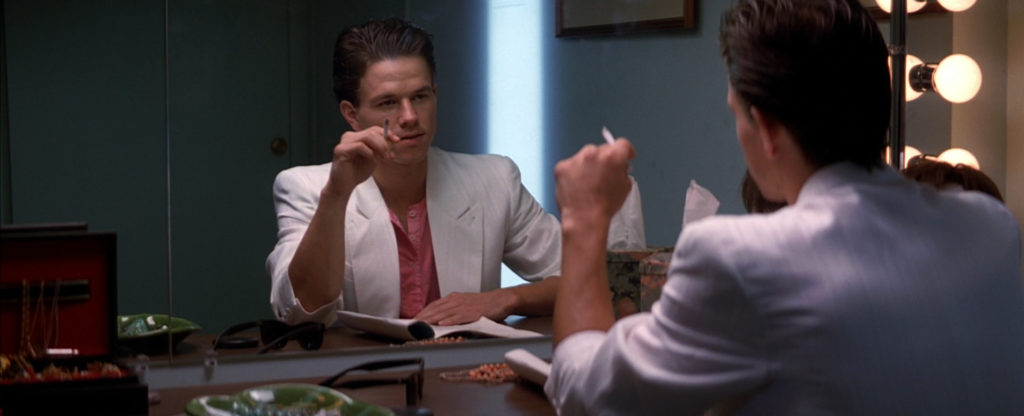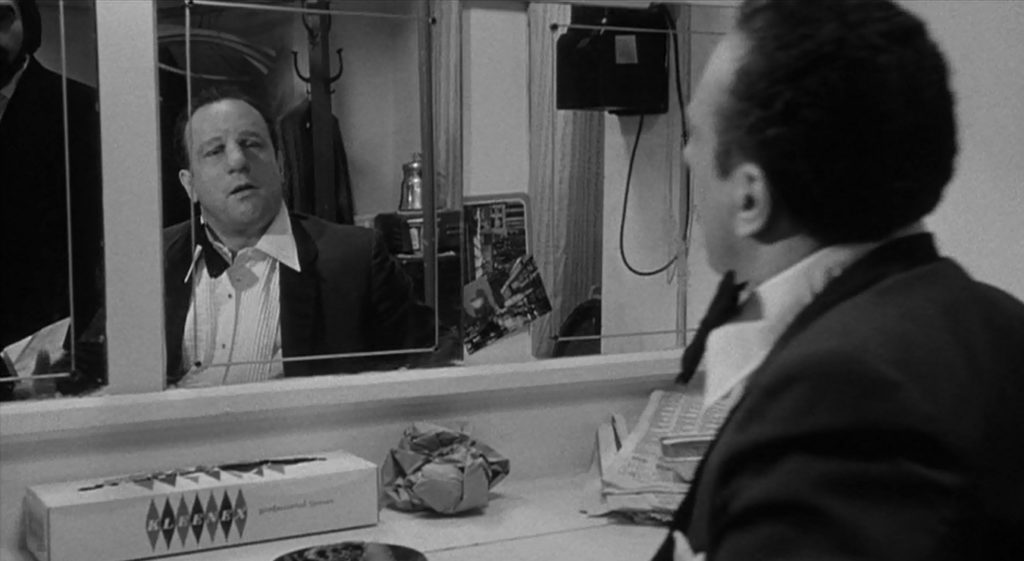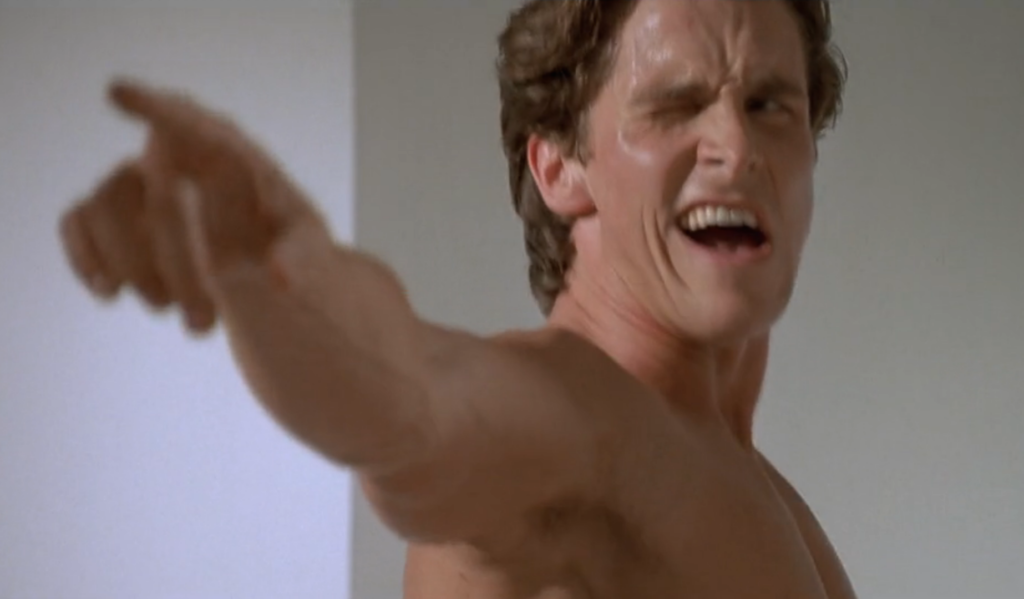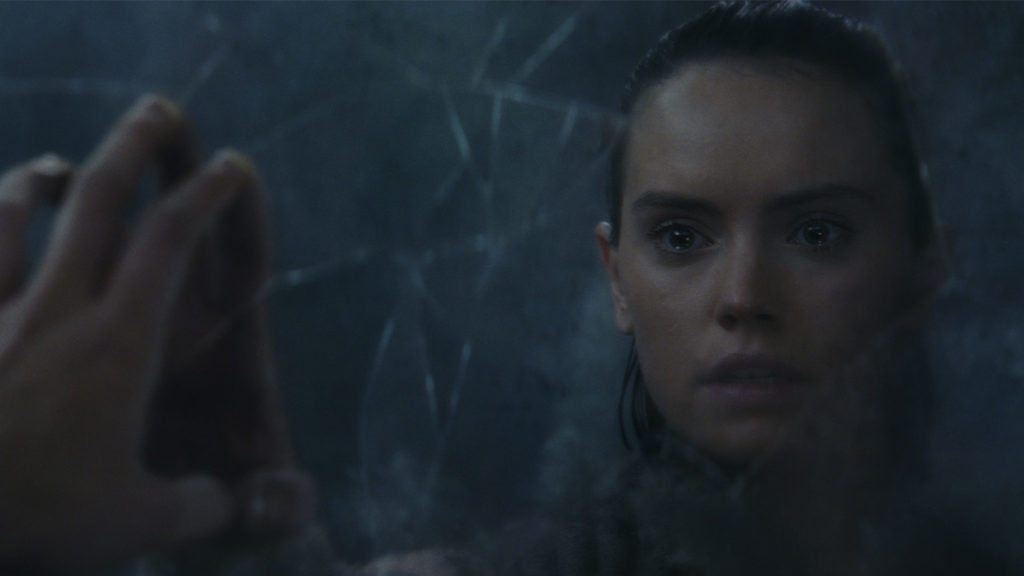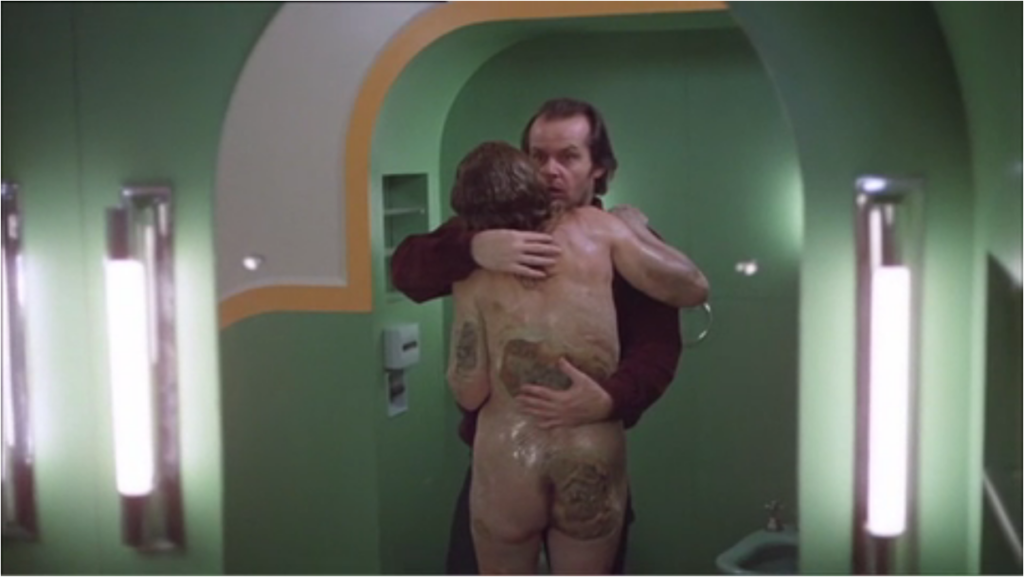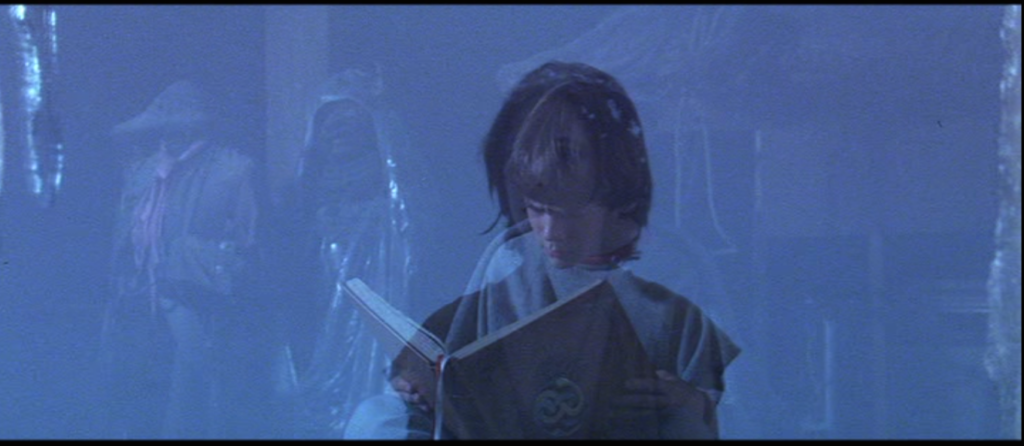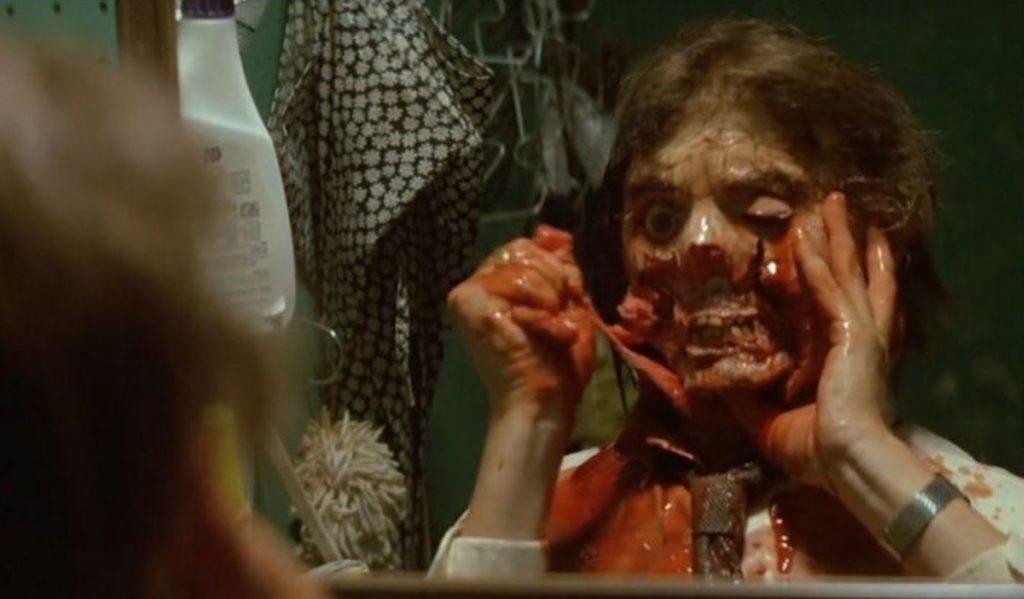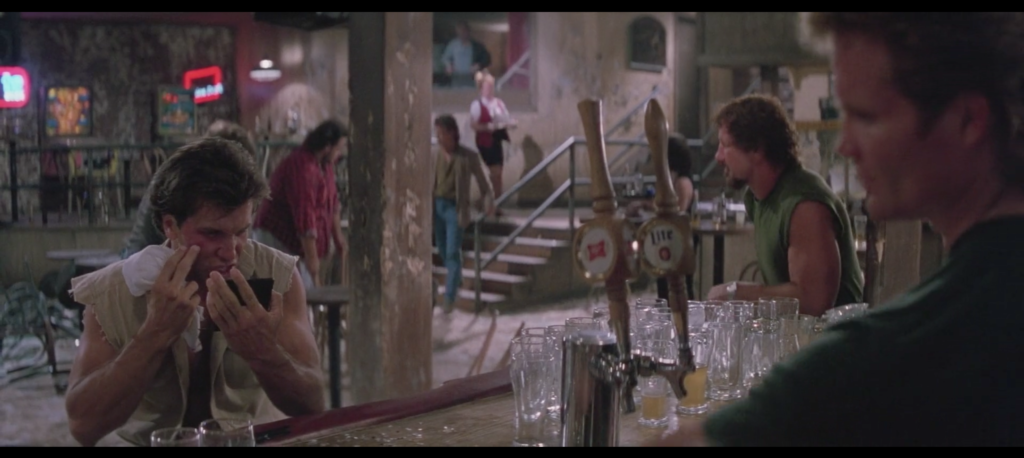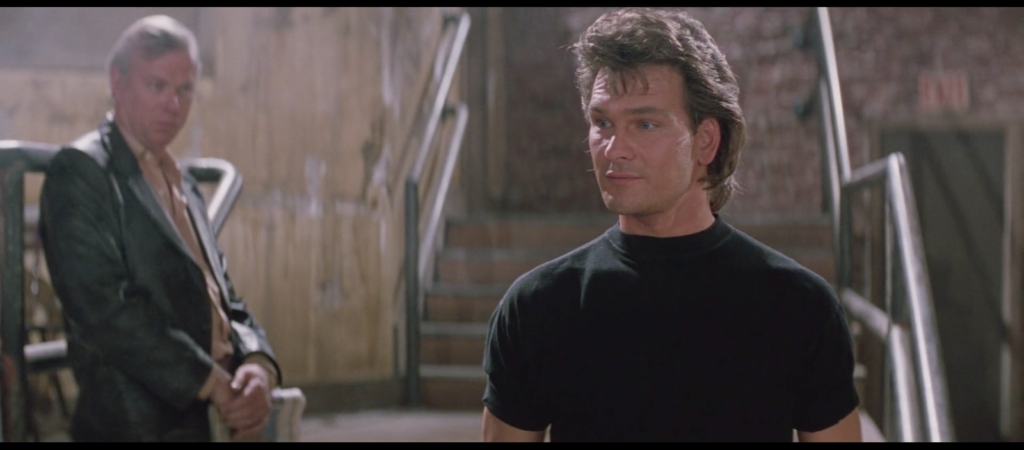Posts Tagged ‘staff’
246. Blowback
September 3, 2019One of the several hypotheticals Pain Don’t Hurt has entertained at length is my belief that Frank Tilghman is the Emperor Palpatine figure of the story, the secret puppet master behind Brad Wesley who engineered the conflict with Dalton and brought it to a head by orchestrating the murder of Wesley and his associates when they were no longer of any use. Another theory Pain Don’t Hurt has espoused is that Frank Tilghman and Pat McGurn, Brad Wesley’s nephew and Double Deuce bartender, were once romantically involved and that he is therefore and visibly upset about having to fire him. They seem mutually exclusive propositions.
But this is true only if you believe that Tilghman is not just sinister but supernatural. No one can control for all variables, and it’s entirely possible that Frank’s Pat-shaped blind spot prevented him from thinking through the consequences of hiring a man to keep everything on the straight and narrow when your ex-lover is a transparent thief and ringer for the very stooge whose downfall you’re plotting. It’s also possible that Frank knew full well that Dalton would exile Pat from the Double Deuce, and that he deemed this an acceptable loss in service of the larger plan. Indeed, he could have considered it a form of alibi—after all, what kind of man would fire his own ex, for whom he clearly still had feelings, if he himself weren’t morally unimpeachable?
What kind of man, indeed.
240. Early warning system
August 28, 2019“Dalton, Red’s place is on fire!” Once more unto the beach, dear Jack, once more; or put the fire out with our Jasper booze. When Brad Wesley’s minions—presumably Jimmy, the go-to guy for arson—sets Red Webster’s auto parts store ablaze, who but Jack would be the man to bring Dalton the bad news? He bursts through the packed Double Deuce crowd with the kind of speed that would make a man his size an absolute phenomenon in today’s pro wrestling world, where agile big men are star attractions. He grasps the severity of the situation. He understands that Dalton is the man to be told, intuiting on some level that Dalton is involved in the conflict that caused the conflagration. Even now he follows the Three Simple Rules, allowing his cooler to determine whether to be nice or to not be nice. He’s watching Dalton’s back, and everyone else’s. He is Jack, the heir apparent, the Dalton Dauphin, the Crown Prince of Cooling. All hail.
238. White Room
August 26, 2019With the Memphis Monologue on one side (following hot on the heels of Wade Garrett’s area hair) and the destruction as if by napalm of Red Webster’s auto parts store on the other (followed immediately by Denise showing us the girls), it falls to Jeff Healey to provide us with a bridge commensurate to that level of emotional intensity and body heat. Boy, does he deliver. The Jeff Healey Band’s rendition of that perennial nightclub floor-filler “White Room” by Cream (just go with it) is an absolute barn-burner (no pun intended), featuring a solo by Healey that could peel paint off the walls. It makes Wade Garrett consider attempting to get hisself double-teamed by two lovely young ladies standing next to him and Dalton, as he indicates to his protégé with a knowing nod and wink. (Dalton shakes his head in that “oh you lovable scamp” fashion; don’t think for a second he’s tempted himself, since his virtue will be put to the test shortly.) I think it’s possible it’s actually what sets Red Webster’s place on fire. It whips ass, is what I’m saying, and the movie is lucky to have music of such self-evident force and badassery in its arsenal when no one’s around to get punched in the head.
228. “Gentlemen, Wade Garrett”
August 16, 2019The staff of the Double Deuce react to the Coming of Wade in a variety of ways. Tilghman leers, of course. The Nameless Bartender’s eyes get a little wide, his mouth goes a little slack. Jack, baffled, asks “Who is this guy?” Hank mutters an awestruck “Holy shit.” “Exactly right,” Wade replies, as if his name were in fact Holy Shit.
In the middle of it all there’s Cody, who whether by the rasp of his voice or the scent of his musk recognizes who the mysterious stranger is and fills in Jack and the assembled gawkers accordingly. “Gentlemen,” he says, “Wade Garrett.” This is a callback to the moment he told the patrons of the Double Deuce that “The name…is Dalton,” obviously; It is Cody’s fate to be the standard bearer for the coolers of the world, the voice announcing their presence.
But does he have to be such a damn sexist about it? He was led out the back door to the scene of the fight by Carrie Ann. When he tells everyone it’s Wade, Stella literally has her hand on his shoulder. “Gentlemen” is what they get in response? “Ladies and gentlemen” and people of every gender identity deserve to know they are in the presence of Wade Garrett when this is in fact so. If Cody has the time to spill the tea on Doc and Brad Wesley, he can throw in a few extra syllables for the sake of inclusivity. They deserve it. Wade deserves it.
215. Tableau V
August 3, 2019Ernie straightening up behind the bar. Carrie Ann lighting a cigarette. Hank sipping his coffee. Whatsername the German schoolgirl–looking waitress wiping down a table. And Dalton, smoke in his mouth, fresh from a day working out and helping Emmett and a night of love with Dr. Elizabeth Clay, doffing his jacket as he arrives for a night’s work, greeted with a “Hey, doll!” and a “There he is!” from his admiring underlings. This is the Double Deuce as it was always meant to be: safe, familial, professional, with a lot of matching reds.
But it is not yet the Double Deuce at its absolute finest. That will require the arrival of another cooler, older, slyer, more powerful, subtle and not quick to anger. It will require us, at long last, to walk the Way of Wade Garrett. Between now and then Dalton will receive very bad news and a very bad beating. It is as if the universe itself cries out, “Not yet, Dalton. Not yet.”
192. ‘Whiskey’s Running Low’: The Tragedy of Keith David in ‘Road House’
July 11, 2019The man in the red shirt is Keith David. You may remember him from his roles in John Carpenter’s The Thing and They Live, two of the best science fiction and horror films ever made. In each he plays the main foil to the protagonists—rough-hewn salt-of-the-earth working-class white-guy types, with tough-as-nails attitudes and impressive heads of brown hair, who find themselves unexpectedly drawn into conflict with forces larger than themselves. Road House, you’ll note, stars Patrick Swayze as a rough-hewn salt-of-the-earth working-class white-guy type, with a tough-as-nails attitude and an impressive head of brown hair, who finds himself unexpectedly drawn into conflict with a force larger than himself.
Naturally, in Road House, Keith David plays a bartender whose sole line of dialogue is “Whiskey’s running low.”
That’s not quite all there is to the role. His name, uttered by both Tilghman and Dalton in this scene, is Ernie, and getting named is an honor precious few supporting characters in this film enjoy. He’s mentioned by name more than all the other bouncers and bartenders and waitresses still employed by the Double Deuce at this point in the film combined, save for Carrie Ann, who says her own name and gets it yelled at her by Pat McGurn. Everyone else? Bupkis.
What’s more, he’s listed with a surname in the closing credits. This too is more than can be said for virtually anyone in the movie. Jimmy, for example, went by “Jimmy Reno” during filming—you can find interview clips with Patrick Swayze in which he calls that character by name, it comes up frequently in interviews with actor Marshall Teague, and it’s in the IMDb listing—but is merely “Jimmy” in every official respect. Dalton himself only gets a mononym unless you inspect his medical file.
Most strikingly, Keith David appears in the opening credits. He’s billed fifth, after only Patrick Swayze, Ben Gazzara, Kelly Lynch, and Kevin Tighe, and just before Kathleen Wilhoite. The actors who play Emmett, Red, and Denise all get lumped together in a single triple chyron, which is fair enough. Sam Elliott gets a “And SAM ELLIOTT” to conclude the cast listing, which is appropriate. Jeff Healey slides in later on via an “Featured Music Performance by The Jeff Healey Band” slug. Other characters you think might reasonably get listed up front—Jimmy, Tinker, O’Connor, Ketchum, Morgan, Pat, Jack—aren’t there at all. Ernie’s fellow bartender, who’s there since the beginning, is entirely uncredited.
If you’ve watched David deftly dance between antagonist, supporting character, and stealth protagonist in The Thing, or if you’ve watched his world-building alley fight with “Rowdy” Roddy Piper in They Live, you probably have some questions about all this. God knows I do.
As best I can ascertain, partially from half-remembered poorly sourced comments in various Road House posts across the internet, and partially based on my own conjecture, is that Ernie Bass was originally a much more prominent character, the bulk of whose storyline wound up on the cutting room floor. I suspect he was a famous bartender, whom Dalton brought in to elevate the Double Deuce’s standing further still—surrounding himself with a surrogate family of old friends which also included Cody, his bandmates, and Wade Garrett. While the material was cut for time, contractual obligations kept David in the picture and in the credits.
A questionable decision, to be sure. Were David cast in a fighting role he’d be an invaluable asset to the film, and even as simply a gnomic presence dispensing basso profundo wisdom behind the bar he’d be a huge get. Instead? He hands Dalton a coffee with a nod of acknowledgement. He tells Tilghman “Whiskey’s running low.” He hands Dalton a phone. He looks at Wade Garrett. He looks at Wade and Dalton together. Exit Ernie Bass, pursued by an editor.
166. Details
June 15, 2019As a visual text, Road House is a chest of wonders. Look at this shot from early on in the film, on the night when Dalton first visits the Double Deuce. There he is at his familiar post, in his familiar shapeless beige jacket. There’s Pat McGurn and The Bartender Who Must Not Be Named behind him, conferring about whatever a sister-son and a working stiff who both happen to have the same job at the same place might confer about. (“So what’s it like working with Exene after the divorce? And this Mortensen kid she’s with, is he cool? Because he seems cool.”)
To the left is a power drinker, passed out on the bar; from this we can infer that Pat, ever conscious of the needs of his uncles liquor distributorship, refuses to cut off even the most obviously inebriated patrons, and most likely pressures the Nameless One into doing the same. Given the behavior of the comparatively sober customers, what does he have to lose, really.
To the right is a detail I’m just now noticing: the dry spongy exposed foam of the bar’s padding, chipped and peeled and torn away by the half-hearted vandalism of the drunk and the fixated. Back in the “everything is padded” days of restaurateurship, such artifacts of idle destructiveness were visible everywhere. I haven’t sat on an upholstered seat at an upholstered table in many a long year, but I can feel the satisfaction of ripping away a chip of covering and pulling at the porous brown stuffing underneath like my hands are doing it right now instead of typing this sentence. For all that Road House is rightfully dinged about its lack of realism, even as regards bar furniture specifically (the price of replacement tables alone from the fight about to ensue would put a normal establishment out of business), that’s some real shit.
And to the right of that? Why, that familiar fellow is none other than Brad Welsey’s own Tinker. Has he come to chat with fellow Wesleyans Pat and Morgan about the art of the goon over a few drinks when they have a moment to spare during their busy evenings of stealing from the cash register and erupting into violence over the slightest provocation? Is he additional muscle to make sure Mr. Wesley’s liquor flows without impediment? Is he simply a fan of the Jeff Healey Band? At another time during this sequence he’s seen chatting up some lovely lady; is the Double Deuce his fern bar, his Regal Beagle? Is this Tinker Tinder?
I’m reminded here of the extensive making-of documentaries included in the Lord of the Rings extended edition sets. I don’t remember the exact wording offered by the heads of the various costume and design and set departments regarding their lunatic attention to detail. I do remember the gist of it, though: They would produce intricate designs for the insides of garments and scabbards or for swords that would only be seen from a distance or for rooms no one would even enter or what have you not because the audience would see them, which they knew they wouldn’t. They did so because they were creating a world for the entire production to inhabit, not just the viewer. A cast or crew member who spent a few seconds admiring the embroidery of their breeches would be that much closer to convincingly conveying the reality of a world of orcs and elves and hobbits and magic rings. Look at the shot above, really look at it, and tell me if he war between the world’s most famous bouncers and the maniac mall devleoper who keeps their bar in Jim Beam seems as much of a stretch as it did before.
134. Nobody ever wins a fight?
May 14, 2019Here are Stella and Carrie Ann, the waitstaff at the Double Deuce, watching Dalton, Jack, Hank, and Younger, the bouncers at the Double Deuce, whip the shit out of Ketchum and his pals, would-be assassins at the Double Deuce. They leer and cheer from the sidelines like extras shown in slo-mo during a Rocky movie when someone’s getting absolutely beaten senseless, only they’re not in slo-mo, they’re in glorious real time. Representative dialogue: “GO ON GO KICK HIS AAASSSSSS!” When the dust settles and the last man goes down you can hear Carrie Ann’s distinctive white-soul rasp: “ALLLRIGHT! YEAH!” She sounds as satisfied as Matthew McConaughey lighting a spliff after having sex for two hours.
And why shouldn’t she? Carrie Ann, we’ve seen, was the victim of sexual harassment we can safely assume was constant until Dalton showed up and announced “It’s going to change.” Stella was almost certainly in the same boat. For untold years, these two women had to take drink orders from men who would convert those drinks into that many more ass-pinches and face-punches. We’ve watched both women resort to using beer bottles as weapons to try and stem the tide of violence in their own favor.
The Double Deuce was an absolute hellhole, a Missouri Mos Eisley Cantina, the Inn at the Crossroads during Lannister rule, Rick’s if Bogey was playing his character from In a Lonely Place and Peter Lorre was the child killer from M and Claude Rains was the Invisible Man. It was a hideous, soul-destroying place to work. It’s a miracle these women made it out emotionally intact.
But it ain’t like that anymore, and I can’t imagine Carrie Ann and Stella are nuts about anyone who’d like to restore that particular status quo ante. They recognize Ketchum and his church potluck pals for what they are. You see in their faces and hear in their voices the hunger of people who are finally getting to see their oppressors get theirs. I’d like to see these faces and hear these voices much, much more often.
132. Jack reacts
May 12, 2019Jack is Dalton’s most promising student, his protégé, the Dalton to his own Wade Garrett. He’s the quickest both physically and mentally, he sees things others do not, he is seldom far from Dalton’s side (except when duty-bound to be elsewhere of course), he shares his observations of the world and receives Dalton’s in turn. Throughout, whether with the genuine happiness of “I didn’t know she could sing!” or the shocked disbelief of “Jesus Christ!” or the exasperated incredulity of “This is a Sears credit card,” he is never less than a hundred percent open to the world and honest in his reactions to it. He moves through life the way one should, even before the Dalton Path lies before him.
But now that it does, even his wordless responses evince that same willingness to take life as it comes. Witness how he handles Dalton’s extremely utilitarian advice following the throwdown with Ketchum and the Men Who Iron Their Jeans Gang. “Give me the biggest guy in the world: You smash his knee, he’ll drop like a stone,” Dalton says, and QED. Jack, however, does not react the way one might to fighting tips, but the way one might to good old-fashioned common sense one has never had the common sense to figure out for oneself until a wiser soul relays it. His eyes widen, his head tilts, his eyebrows go up, he nods slightly, and his smile says “Huh, I’d never really thought about it that way before, but you’re right!” It’s as if Dalton just said “Don’t worry, you won’t have trouble making it to the Fotomat before closing—school’s out, so traffic’s gonna be lighter this afternoon,” or “If you tell the kid no, he’s just gonna sneak in, so at least buying him the ticket to the R-rated movie yourself keeps the lines of communication open.” “Oh yeah,” says Jack’s face, “good point!” Which it is, I suppose, if faced with a big guy and a knee. But Jack teaches us here as much as Dalton does.
130. The Third Rule, Verse 5
May 10, 2019“This is the new Double Deuce,” says Frank Tilghman. We are at the start of an all-hands staff meeting, and Tilghman is pointing to the concept art for the bar’s redesign. But standing nearby is his latest hire, Dalton. It is through Dalton, with Dalton, in Dalton that the new Double Deuce will be achieved. Dalton embodies the new Double Deuce. He is its future.
When Dalton takes over as cooler he becomes more than just the chief bouncer. His role is not to handle a series of discrete incidents, but to institute sweeping reforms that will eliminate such incidents forever. “It’s going to change,” he states—not a threat, not a promise, a fact. His bouncers, too, must change for this to take place. As below, so above.
Bouncing on the Dalton Path is a matter of following “three simple rules.”
This, for the sixth time, is the third.
3. Be nice (continued)
Previously:
- The Great Commandment
- The Parable of Someone Getting in Your Face and Calling You a Cocksucker
- Walking the Dalton Path Together
- It’s a Job / It’s Nothing Personal
Whenever two or more nouns are gathered to call a name, there is hate.This is the difficulty—well, one of the difficulties, in addition to being barred from coming within 200 yards of Jasper High—facing Steve the Horny Bouncer. He has heard Dalton’s commandment. He has heard the parable of someone getting in your face and calling you a cocksucker. He’s heard about the power of community, the innate dignity of the laborer, and the fact that it, whatever it is, is nothing personal. He simply isn’t buying it.
“Uh-huh,” he says, the sarcasm dripping from his lips in sufficient quantity to stain his shirt, were he wearing one. “Being called a cocksucker isn’t personal?” Gyp Rosetti, you have a friend in Steve.
“No,” says Dalton coolly and confidently. (Considering the degree to which men routinely sexualize their antagonism toward him, I’d say this is a man who’s been called a cocksucker many, many times.) “It’s two nouns combined to elicit a prescribed response.”
Well goddamn, looks like he was a linguistics minor in NYU! Thanks there, Chomsky!
Of course, he’s right. One need look no further than the fact that this is my 130th essay about a movie called Road House in 130 days to see that combining two nouns in the right way can elicit one hell of a prescribed response. I have chosen to give myself over to that response, but that’s just it: I made a choice. Dalton is attempting to convince the skeptical Steve that he has a choice too, and he can choose to let that shit slide.
Steve, you will not be surprised to learn, is not buying it. However, while dumb, he is no dummy. He senses he will not be able to best Dalton in the squared circle of neurolinguistic programming. Better for him to take a new and even more direct approach:
“What if somebody calls my mama a whore?”
Actor Gary Hudson’s delivery of the word “whore” is remarkable, a cousin in its way to Joe Pantoliano as Ralph Cifaretto, exasperatedly insisting “She was a hooah.” He takes the word and purses his lips and shoots it out the side of his mouth, like he’s trying to send it scurrying out of the servant’s entrance before the Duchess arrives. Nervous laughter erupts. All that his smug look of triumph afterwards lacks is the voice of Ra’s al Ghul from Batman: The Animated Series saying “Checkmate, Detective” or some shit.
Which leaves him wide open for Dalton’s riposte:
“Is she?”
Nervous laughter bubbles up again, at Steve’s expense this time. His smile sours. He takes the napkin or whatever he’s been tearing up OCD-style and tosses the latest shred to the ground in a rage. Anything he says would imply acceptance of Dalton’s framework, that rather than being some outlandish insult, the notion that Steve’s mother is a sex worker is a matter of some debate. Not since Dalton told Morgan “opinions vary” has he so thoroughly shut someone down.
Note that Dalton himself is agnostic on the issue. I’m not claiming any kind of “sex work is work” points for Dalton; this was an era in which even an NYU philosophy major may not have encountered this kind of thinking, and moreover his attitude toward Denise after her topless dance smacks of SWERFiness. And yet one is reminded, is not one, of Matthew 26:63-64: “And the high priest answered and said unto him, I adjure thee by the living God, that thou tell us whether thou be the Christ, the Son of God. Jesus saith unto him, Thou hast said.” Tou-fuckin-ché, Caiaphas.
And so it us unto you, Horny Steve. You have just given Dalton the rope to hang you with, rhetorically. When you diss Dalton, you diss yourself, and in so doing you yourself have set up the perfect demonstration of the wisdom of “Be nice.” Did Dalton say anything insulting? You’ll notice he did not! He left it to his foe to be his own undoing. Petard, here be thy hoist.
129. The Third Rule, Verse 4 Revisited
May 9, 2019“This is the new Double Deuce,” says Frank Tilghman. We are at the start of an all-hands staff meeting, and Tilghman is pointing to the concept art for the bar’s redesign. But standing nearby is his latest hire, Dalton. It is through Dalton, with Dalton, in Dalton that the new Double Deuce will be achieved. Dalton embodies the new Double Deuce. He is its future.
When Dalton takes over as cooler he becomes more than just the chief bouncer. His role is not to handle a series of discrete incidents, but to institute sweeping reforms that will eliminate such incidents forever. “It’s going to change,” he states—not a threat, not a promise, a fact. His bouncers, too, must change for this to take place. As below, so above.
Bouncing on the Dalton Path is a matter of following “three simple rules.”
This, for the fifth time, is the third.
3. Be nice (continued)
Previously:
- The Great Commandment
- The Parable of Someone Getting in Your Face and Calling You a Cocksucker
- Walking the Dalton Path Together
- It’s Nothing Personal
But there’s more to Verse 4, isn’t there? Dalton doesn’t merely tell his acolytes that bouncing is nothing personal. He chooses to emphasize that bouncing is a job. Bouncing is work. Bouncing is labor. Through this lens, perhaps, we can arrive at the cod Marxism for which Road House has been crying out for years.
We’ve discussed one interpretation of the latter portion of this verse already—the need to maintain a level head, a distanced perspective, the ability to distinguish between professional challenges to be surmounted and personalized challenges to be destroyed.
At this point Dalton could, and indeed at a subsequent point he will, emphasize the “sticks and stones may break my bones” element. He could, and will, insist that though they will be dealing with physically and verbally aggressive patrons, those patrons have no insight into the men bouncing them and thus their words and deeds carry no true weight. That’s one interpretation of “it’s nothing personal,” and it’s valid.
But what does Dalton mean by counterposing “it’s nothing personal” with “it’s a job”? By situating bouncing within the context of labor and setting this up in opposition to the personal, he is underlining—and not for the first time—the communal nature of the task. The bourgeois conception of personhood, atomic individualism, false individual consciousness, Thatcher proclaiming “there is no such thing as society”: These have no place Dalton’s philosophy. When you do a job you do so in concert with your fellow workers, and, ideally, for the benefit of workers as a class.
You are no Morgan, searching for opportunities in which to vent your rage and exercise power at the expensive of the collective.
You are no Pat, enriching yourself at your fellows’ expense.
You are no Steve, fucking young women of uncertain age in the breakroom, or Judy, selling cocaine in the bathroom, indulging in hedonistic pursuits while others shoulder your burden.
“You are the bouncers,” Dalton says at the end of the Giving of the Rules. You are the proletariat. Through your labor the value of the Double Deuce is derived, a fact which is made plainer and plainer as the film goes on.
“I am the cooler.” Dalton is the vanguard. He seizes power with the intent of awakening the wider class of bouncers to their revolutionary potential and diffusing that power among them, and unlike other vanguardist movements he does so.
“Watch my back and each other’s.” Solidarity forever.
“Take out the trash.” Up against the wall, motherfuckers.
125. “I didn’t know she could sing!”
May 5, 2019If this configuration of Dalton and his padawan-learner Jack looks familiar, it’s because we’ve been here before. The exchange and fight scene that are about to occur are perhaps the purest distillation of the Dalton Path in the entire film, following the Three Simple Rules and their various chapters and verses to the letter. As a bonus they show the primacy and utility of Jack among the Double Deuce’s other bouncers. It is Jack, after all, to whom Dalton relays the Riddle of the Right Boot, counting on the younger man to solve it. When they move on the intruders who’ve come to the bar to murder a man by kicking him in the head with a boot-mounted knife on account of the fact that he fired a rich guy’s nephew, they move as one.
But how did they arrive at this point? By what strange magic were Dalton and Jack united at this moment? The magic…of rock.
Specifically Carrie Ann’s variant thereof. The big-grinned barmaid with the bangs has traditionally occupied a privileged position in Dalton’s orbit. It is she to whom he first entrusts the secret of his name. It is she who preaches his name to the other barfolk. It is she who is granted a glimpse of the ass.
Now that the Double Deuce has been cleaned up, it is she who takes the stage to demonstrate this fact to the viewer. Would any woman have been caught dead on the stage of the old Double Deuce, where the only thing separating you from the ravening hordes, whose attention is drawn to and focused on that stage in a way no other staffer or patron can claim, was a thin chickenwire line? To be honest, dead might be the only way a woman would get caught on that thing. Putting a blind guy up there strikes me as some kind of ADA violation as it is.
But now things are different. How different? Different enough that a server is up there singing her gorgeous, joyful heart out. (Kathleen Wilhoite is truly one of this movie’s MVPs; I have no doubt from the way she shakes and grooves and grins and at one point even puts her hand to her face like “holy shit I can’t believe this!” is a sign of completely sincere pleasure on the part of the actor herself.) A few weeks earlier she had to save all her vocal power for yelling “BASTARD!” at people she’d just brained with a beer bottle in a barfight. Now she’s singing Eddie Floyd with the Jeff Healey Band.
That’s why Jack drifts over to Dalton that night: Just to smile with delight and say “I didn’t know she could sing!” He’s so happy in that moment, so happy to see someone he thought he knew reveal a new and exciting side of herself, so happy to know that as a bouncer on the Dalton Path he helped make that happen. It’s his desire to share that happiness that puts him by Dalton’s side when Ketchum strides in, anonymous minions by his side, to try to kickstab Dalton in the skull. The right place at the right time, that time being “time to not be nice.”
Call it a coincidence if you want, or even synchronicity. I call it the ne plus ultra illustration of the Third Rule, and of how the obervance of that rule yields dividends none could predict. Be Nice, commands Dalton. So mote it be.
123. Chicken wireless
May 3, 2019Dalton purged the staff of the Double Deuce of its criminal element.
Dalton purged the crowd of the Double Deuce of its criminal element.
Dalton defeated the minions of Wesley in open combat.
Dalton liberated the small businessmen of Jasper, Missouri from the Jasper Improvement Society.
Dalton saved the life of yeoman rancher Emmett.
Dalton put the minions of Brad Wesley down like dogs, one by one.
Dalton lulled Brad Wesley into a false sense of victory that enabled the small businessmen of Jasper, Missouri to gun him down.
Dalton taught the bouncers of the Double Deuce to walk the Dalton Path.
Dalton taught Dr. Elizabeth Clay how to love again.
Dalton freed Jasper, Missouri from tyranny.
For these deeds we honor him.
For these deeds we celebrate him.
But through his efforts, Dalton also freed the Jeff Healey Band from the loose-hanging confines of their chicken-wire prison.
And it is for this deed that we dedicate our lives to his service.
So was it nice. So is it nice. So ever will be it nice.
In the name of the Dalton, the Jack, and the Holy Wade.
Amen. Amen. Amen.
—from the Most Meet and Worthy Charter of the Holy Jasper Empire, Forty-Fifth Post-Tilghman Schismatic Revision; So Decreed by the Ass-Mother of the Sisters of Carrie Ann and the Eternal High Priestess of the Elizabethan Order; So Ratified by the Intranuclear Auto Sales Consortium, the Swords of Tinker, the Swords of Denise, the Cody Navigators, and the Guild of the Valet Visible; Sworn by the Blood of the Bleeder, Jasper IX, AD 7201
108. Dead man revisited
April 18, 2019“You’re a dead man,” Morgan tells Dalton when he gets fired. Carrie Ann, Morgan’s now-former coworker, may not share his idiosyncracies regarding where to place the emphasis when speaking, but she does share his sentiment.
The morning after Dalton’s momentous first night in the Double Deuce’s employ, Carrie Ann heads over to his luxury barn to feed him breakfast and, lucky for her, see his bare ass and reenact that gif of Ariel the Little Mermaid leaning on a rock as a huge gush of water erupts around her as a result.
But she brings business to go along with her culinary and visual pleasure. Firing Pat McGurn, one of the Double Deuce’s bartenders, is something Dalton should not have done, she tells him. As a mostly mute (but for grunting and an admittedly sincere-sounding “thank you”) Dalton sits down with a lit cigarette in his mouth and no shirt on his torso, disgustedly tossing aside the bacon and egg sandwich or whatever it is she brought him and moving in on the coffee, Carrie Ann starts cracking up while saying “Oh my god.”
“What is the joke,” Dalton asks, sounding like a cop on a TV show who just got a call at 3:30am saying there’s been another homicide down at the docks.
“Well, there’s no joke,” Carrie Ann says. “I just think I’m looking at a dead man, though.”
“Seems everywhere I go I hear that same joke,” Dalton mutters, shaking his head.
“Yeah? Well, something tells me you bring it on yourself,” Carrie Ann says saucily, nibbling on her breakfast in eating the popcorn/sipping the tea mode.
The variation in affect between the two actor makes it tempting to write this scene off as a minor bit of light-comedy character building. Dalton, who is hung over from a long night reading A River Runs Through It, is gruff and world-weary, too tough to worry and too tired to care. This is just how he lives his life: an endless cycle of naked wake-ups, shirtless stretching, cigarette-flavored coffee for breakfast, some tai chi or perhaps hitting the heavy bag for a workout, grabbing an unstructured jacket, heading to work to get stabbed by various men in the course of kicking their asses, repairing the damage done to his car by those men on their way off the premises, driving back to his luxury bachelor pad right next to the horse pen, taking off his shirt, reading a book, spying on Brad Wesley’s in-ground pool orgy, and finally doffing his jeans and hitting the sack. If during the course of those events people pronounce him a dead man, it’s a job, it’s nothing personal. And Carrie Ann is just the platonic female foil, the funny best friend, who’s able to poke holes in his machismo but not actually call his narrative into question or anything of that threatening nature.
But Carrie Ann, the drinking man’s Cassandra, also knows well that the only person who can truly save Dalton is himself. A warning out of professional courtesy, a gesture of solidarity with a new friend, an excuse to go over to the hottest guy in town’s place—it’s probably all three of these things. But in reality what he’s saying is “I can’t help being what I am,” as a stoic positive; she’s saying it too, but as a cheerily black-comic negative. Worst of all, it’s a direct challenge to the Rules. All that talk about expecting the unexpected, remembering it’s a job, it’s nothing personal, be nice until it’s time to not be nice, watch my back and each others’, and so on…earns him death threats “everywhere I go”? Okay dude, her twinkling eyes and cocked head seem to say, it’s your funeral. We’d expect no less of a dead man.
105. Fate
April 15, 2019One hundred essays into a year-long Road House writing project, I feel about the film’s attempts to coin catchphrases and aphorisms exactly the way I felt when I’d written no essays at all: yikes. I mean, Does a hobbyhorse have a wooden dick, folks. Balls big enough to come in a dump truck. The writers have a relationship with the English language only slightly less estranged than their relationship to male sex organs.
But they can’t all be losers.
Just after the dump truck incident, a grumpy Morgan (there is no other kind of course) stomps over to Cody, whom he knows has a preexisting relationship with their mysterious new colleague. “This Dalton character,” he grumbles, “what’s his story?”
“His story is, you fuck with him and he’ll seal your fate,” Cody replies.
Now that’s how it’s done.
It’s a marvelous exchange insofar as it’s a rare moment when two characters have a conversation during which Dalton is neither a participant nor present. These are few and far between in this film, to the point where they stand out like sore thumbs each and every time. Off the top of my head, there’s this conversation, there’s Brad Wesley beating up the bleeder, Wesley and Jimmy talking to Red briefly after Dalton departs his store, and Jimmy and Ketchum spying on Dalton and Elizabeth from afar. Unless you count Wade Garrett breaking up shenanigans at a strip joint prior to receiving a call from Dalton, or Wade Garrett asking for Dalton’s whereabouts when he arrives at the Double Deuce, or Wesley’s goons making small talk prior to Dalton’s final assault on the Wesley compound, or Steve and Agnes doing their regular Saturday night thing before Dalton pops in and fires him—all of them scenes that exist so that Dalton can join them in progress—that is it. This is Dalton’s world, and what a treat to see other people live in it.
And who are the people in question this time around? Blind white blues musician Jeff Healey and hardcore wrestling legend Terry Funk. For Road House fanatics this is like the De Niro/Pacino diner scene in Heat.
But don’t think it’s just some goofy novelty act. (I didn’t say “Don’t think it’s some goofy novelty act,” mind you, I said “Don’t think it’s just some goofy novelty act.) Throughout this project I’ve been impressed by what the…let’s say non-traditional actors bring to the table. The naturalism Terry Funk brings to his role as an enormous man who gets paid to get angry and beat the shit out of people with tables is obvious. But spare a thought for Jeff Healey, too, who sounds like exactly what he is supposed to be: a guitar player chatting with dudes in bars. It works when he’s serving as a welcoming presence for Dalton, the one character he neither needs to intimidate nor impress, and it works when he drops the “hey man lemme put this here guitar down and buy you a beer” schtick and describes his friend like he’s the fucking Shogun Assassin.
Because that’s the message of “you fuck with him and he’ll seal your fate,” isn’t it. He won’t just kick your ass, or kill you, or make you wish you were never born or blah blah blah. Like a Norn with a mullet, he’s got the thread of your life in his hands, and if you step to him you’re going to find out exactly where that thread ends.
There’s another implication here that must be considered: Fate is predestined. Cody’s description of Dalton, then, is of one who will mete out the appropriate and appointed sanction to those who cross him, no more and no less. Perhaps it will be your fate to disappear from the movie a third of the way through and never return, like Karpis. Perhaps it will be your fate to pass out from terror when a stuffed polar bear is dropped on you and then emerge reborn, your sins forgiven, like Tinker. Perhaps it will be your fate to be murdered offscreen while wearing moonboots, like Morgan. Whatever the case, Dalton is not making the news, he’s simply delivering it to your doorstep.
It’s precisely the right description for the Dalton Path. Remember Rule Three, Verse Four: “It’s a job. It’s nothing personal.” What can be more impersonal than fate? And who better to do the job of sealing it?
104. I Thought You’d Be Bigger Vol. 2: Cody
April 14, 2019For a recurring joke, “I thought you’d be bigger” gets deployed with a pretty broad affect range. The first person we hear say this to Dalton is Frank Tilghman, whose delivery is difficult to characterize in any way but sexual. The second is Cody, lead singer of the Jeff Healey Band in the Road House Universe, and his delivery could not be further removed from his and Dalton’s mutual employer.
Dalton arrives at the Double Deuce, takes in the scenery, and discovers that the bar band are old friends. He sneaks up on the lead singer with the help of his identical and yet somehow not related bandmates, with a theatrical finger-to-the-lips Marian-Madam-Librarian “shhhh” gesture he shares with each. He hands Cody a towel to mop up the accumulated sweat and projectile beer on his face, for which Cody thanks him. “You play pretty good for a blind white boy,” Dalton says, beaming. Recognition dawns in Cody’s face. “Yeah, and I thought you’d be bigger,” he jokes, and the two embrace, laughing.
I’m gonna level with you: I love this moment. Why? Because it’s one of the only times in the film where Dalton is completely at ease. He’s been reunited with an old friend, a peer, not someone he has to impress, not someone he has to instruct, not someone who mentored him, not someone he needs to mentor. They know each other well, but as colleagues rather than sensei and student. They pass feverish gossip about old times and current times: “Man, this toilet is worse than the one we worked back in Dayton,” Cody says. He also mentions that he and “the boys” heard Dalton was headed to Jasper, presumably from Tilghman, although word among barfolk travels far and fast of course. Dalton therefore does not need to dazzle Cody, nor earn his respect. Cody’s been sitting on his barstool on stage, guitar in his lap, waiting to welcome Dalton with open arms. Anyone would be happy to step into that situation.
But most important of all is that this exchange is just that: an exchange. Dalton ribs Cody in a way he is, presumably, accustomed to being ribbed—that his chosen genre and evident skill are anomalous given his race and disability. Cody thinks this is funny to hear, which indicates he’s heard it a million times before. He uses “I thought you’d be bigger” as a riposte, indicating that these two have shared late-night “You know what people say to me all the time and totally drives me nuts?” conversations over Miller Genuine Draft when the patrons of that toilet in Dayton have long since retired for the evening.
The point I’m trying to make is this: While Tilghman’s “I thought you’d be bigger” is off-putting and invasive, Cody’s is familiar, friendly, and inviting. Eat your heart out, Snake Plissken and “I heard you were dead.” Patrick Swayze and Jeff Healey just took you to catchphrase school.
103. Dump truck
April 13, 2019This much, at least, is not in dispute: When Dalton’s first night at the Double Deuce is winding to a close, Morgan, who is skeptical about the man’s physical prowess, tells him the following.
“You know, I heard you had balls big enough to come in a dump truck, but uh…you don’t look like much to me.”
“Opinions vary,” Dalton replies, and Morgan is temporarily bested.
But while that may settle the issue for the involved parties, we are left with unanswered questions. To wit: When Morgan says he’s heard Dalton’s balls are big enough to come in a dump truck, does he mean A) a dump truck is required to carry them on account of their large physical size, or B) a dump truck is required to receive Dalton’s ejaculate load due to the copious amounts of semen his big balls produce? “Come” as in “arrive,” or “come” as in “cum” as in “ahh skeet skeet motherfucker”? As Dalton himself might say, opinions vary.
Below you’ll find the best cases I can make for and against the two competing interpretations.
Morgan means “come” as in “travel”
PRO:
- Saying someone has “big balls” is a way of saying they’re unusually gutsy or tough, traditional characteristics, one would think, of a famous bouncer
- Dump trucks are known for carrying things placed in them and can accommodate substantial size and weight, making for a strong metaphor
CON:
- Placing his gargantuan sack in a dump truck would leave the rest of Dalton’s body at something of a loss were the truck to go anywhere, the Double Deuce’s parking lot for example
- Dump trucks typically transport dirt, rubble, or refuse, none of which describe Dalton’s testicles
Morgan means “cum” as in “bust a nut”
PRO:
- The measure of a man’s balls could in theory be taken by the size of the receptacle required to contain a full emission of his seminal fluid; from this we can infer that were the bed of a dump truck required to catch all of Dalton’s ropes in their entirety, his yarbles must needs be very big indeed
- Simply weighing or determining the circumference of Dalton’s ballbag implies passivity on his part, while the thought of Dalton milking, or causing a third party to milk, his dick into the back of a construction vehicle demonstrates the activity and agency becoming of a bouncer
CON:
- Dump trucks are not recommended vehicles of liquid waste; absent a watertight truck bed Dalton’s jism could seep through the seams and on to the road surface below, causing a potential traffic hazard and thus negating the central idea of the metaphor as a means to convey his professional clout and skill
- The size of Dalton’s cock, which due to the nature of the orgasmic process would play an indispensable part in the process of cumming into a dump but not in the process of simply transporting Dalton’s huevos in one, goes conspicuously unremarked upon
CONCLUSION:
Occam’s razor suggests Morgan means he’s heard that Dalton’s balls are so big he would not be surprised to see them being carried by a dump truck, not squeezed like lemons into one. However, the imagistic approach of the latter interpretation has much to recommend it as a hypothetical alternative.
102. Mirror
April 12, 2019101. The Third Rule, Verse 4
April 11, 2019“This is the new Double Deuce,” says Frank Tilghman. We are at the start of an all-hands staff meeting, and Tilghman is pointing to the concept art for the bar’s redesign. But standing nearby is his latest hire, Dalton. It is through Dalton, with Dalton, in Dalton that the new Double Deuce will be achieved. Dalton embodies the new Double Deuce. He is its future.
When Dalton takes over as cooler he becomes more than just the chief bouncer. His role is not to handle a series of discrete incidents, but to institute sweeping reforms that will eliminate such incidents forever. “It’s going to change,” he states—not a threat, not a promise, a fact. His bouncers, too, must change for this to take place. As below, so above.
Bouncing on the Dalton Path is a matter of following “three simple rules.”
This, for the fourth time, is the third.
3. Be nice (continued)
“I want you to remember,” says Dalton, “that it’s a job. It’s nothing personal.”
Thus far, Dalton has explained the third and simplest of his Three Simple Rules in comparatively painstaking detail. He has articulated its Great Commandment. He has preached the Parable of Someone Getting in Your Face and Calling You a Cocksucker. He has emphasized its communal nature. And now he says it’s nothing personal?
I’d like to take this opportunity to introduce you to a man named Gyp Rosetti.
ROSETTI: “Bone for tuna.”
TONINO: What?
ROSETTI: “Bone for tuna.” What the fuck’s that’s supposed to mean?
TONINO: Oh. The kid’s Irish. The pronunciation was off. I think he meant—
ROSETTI: I know what he meant. Who the fuck is Nucky Thompson to wish me good luck? And in Italian, no less, like he’s mocking me? He’s real cute, I’ll fucking tell you. Sets me up to lose, pulls our whiskey deal at the last minute, then it’s buon fortuna like he’s rooting for me to get back on my feet. Push me off a cliff, why don’t you.
TONINO: Sure, I mean—
ROSETTI: Good luck flapping your arms on the way down! Am I right?
TONINO: Sure, I mean—
ROSETTI: Real attitude on him. Scrawny Irish prick. I need his blessing to make my way in the world?
TONINO: He w—
ROSETTI: I need him? To lecture me? “Nothing’s personal”? What the fuck is life if it’s not personal?
So you can see Dalton’s dilemma. Here he is, new in town, new in the job, new to these men, whose job it is to physically fight, restrain, and eject other men. His first order of business is to fire two of their coworkers, neither particularly well-liked, but each emblematic over his power over their employment and thereby their lives. He’s told them It’s my way or the highway and rattled off a list of undesirables who frequent the bar, a state that’s going to change. The implication is clear: His way is superior to theirs, which has demonstrably failed. From there he launches into a disquisition on bouncer conduct that is rife with paradox and contradiction as well as comprising a nearly diametrically opposed approach to the craft than that which they have heretofore pursued. After all this, after telling these violent men how to do their violent jobs by moderating their interactions with other violent men under the threat of termination, Dalton has the temerity to tell them that when the time comes and they are being pelted with verbal and physical abuse and they must decide whether and how to strike back, that all of this is nothing personal? Doesn’t he see how they would take this? Doesn’t he know it reads as insanely pollyannaish at best, insulting at the most reasonable, and downright dangerous at worst? When confronted with well-meaning advice by someone with whom you are at odds—and what is a worker if not at odds with the boss—even the most anodyne bromide, like wishing an associate “good luck” in his native language when a business deal goes south, feels like fighting words. Doesn’t Dalton realize that telling these men in this context that this job is nothing personal is tantamount to throwing down the gauntlet and fucking daring them to take it personal?
Yes. Yes he does.
If you think this sentence is confusing, then change one pig.
(to be continued)

